Excellent pictorial essay by Agence France Presse on the state of people in northeast Nigeria internally displaced by Boko Haram. This story needs to be read! People need to pray!
Stefan Heunis
Maiduguri, Nigeria -- It may be the rainy season, but the savannah scrubland stretching out below me is dusty, dry and brown, linked by a spider’s web of dirt tracks and footpaths.
I’m in a plane descending toward the Maiduguri International Airport and squint to focus on the hamlets dotted across the landscape.
It’s my third visit here and once again I can’t see many natural water bodies, which gives me a familiar uncomfortable feeling. “How do people survive in this harsh climate?” I wonder. I remind myself to stay hydrated.
Touch down in Maiduguri and the light is blindingly bright. The air hits you in the face like a hairdryer on its hottest setting.
I’ve come here to report on the latest calamity to befall the capital of Borno state. Sitting on the north banks of the seasonal Ngadda river and historically a major commercial hub just south of the Sahara, it was fought over for centuries by traders, traditional and religious leaders, then about a century ago the colonialists.

(AFP / Stefan Heunis)
Over the past several years, it had become more notorious as the birthplace of Boko Haram, the Islamist group whose insurgency has devastated northeast Nigeria since 2009 and spilled across the border into Cameroon, Chad and Niger.
AFP has covered the insurgency since it began: the horrific and relentless attacks on mosques, churches, markets and bus stations, suicide bombings and raids on remote villages. In the last 18 months the Nigerian military, helped by its neighbors, has reclaimed territory from the insurgents, apparently weakening the radical group to the point of "technical" defeat.
But this doesn't mean the people living here are doing any better.
In recent weeks another shocking dimension of the conflict has emerged: severe food shortages have meant that hundreds of people -- in particular children -- are suffering from severe acute malnutrition.
That’s a fancy way of saying they’re starving. Sometimes to death.

(AFP / Stefan Heunis)
The camps for internally displaced people (IDPs) where the worst malnutrition cases have been reported are not accessible without military assistance, so we decide to drive to an informal settlement in Muna, a suburb on the outskirts of Maiduguri where the UN children’s agency UNICEF runs a nutritional clinic.
Maintaining dignity
Before going to a place like Muna, I always try to figure out the best way to portray the situation in the most honest way I can, while still maintaining the humanity in the subjects.
It is never easy to witness suffering and be practically powerless to affect change, to do anything about the people’s immediate circumstances.
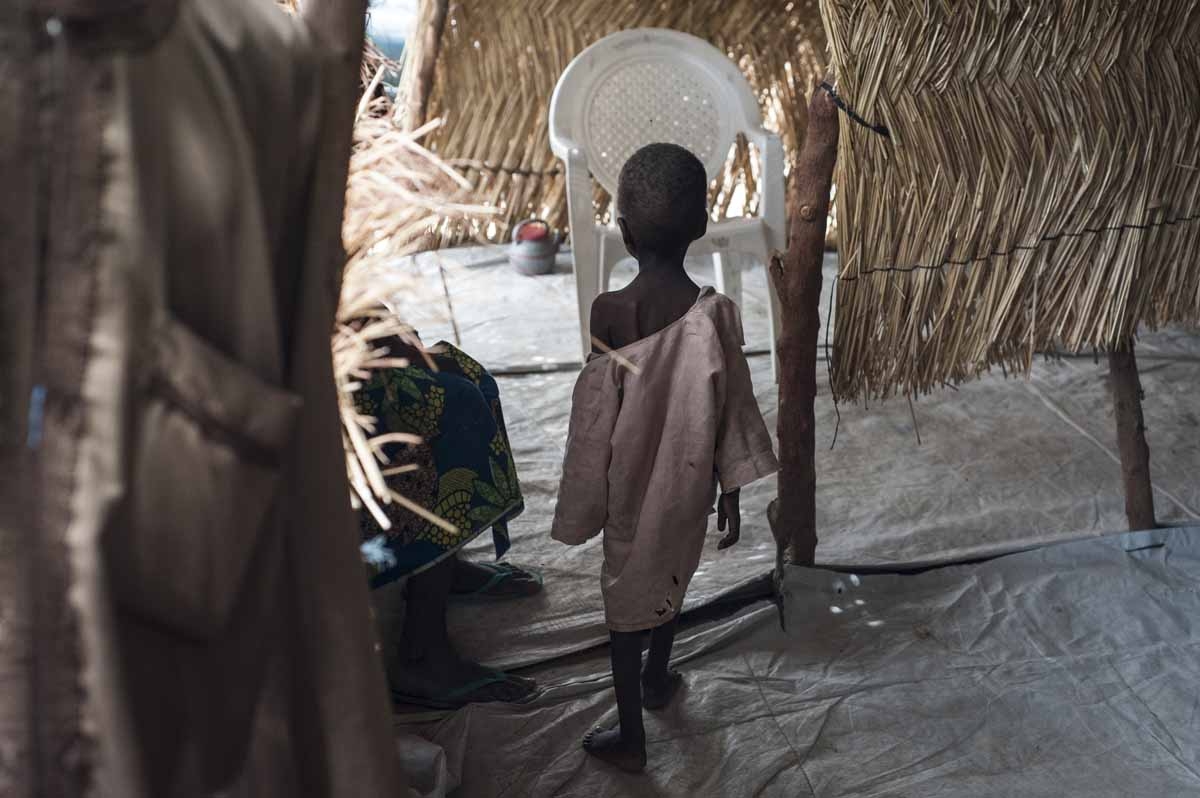
(AFP / Stefan Heunis)
It’s challenging because you need to retain respect for your subjects, which in this case entails focusing a lens on them and capturing that moment in time. I believe part of that respect comes with sensitivity towards the different realities that you are presented with.

(AFP / Stefan Heunis)
My first impression of the Muna settlement is of a dry dust bowl, a barren patch of land devoid of grass and vegetation. The tents are scattered in clusters over the naked earth and the sun beats down on the ground.
It’s so hot that at first you don’t even notice the people. Everywhere you look are mirages from the heat and the people are blurred into the background and surroundings.
The camp is now home to nearly 16,000 people and is growing by the day. You can practically taste the despair -- there is no food, few opportunities and no shade.
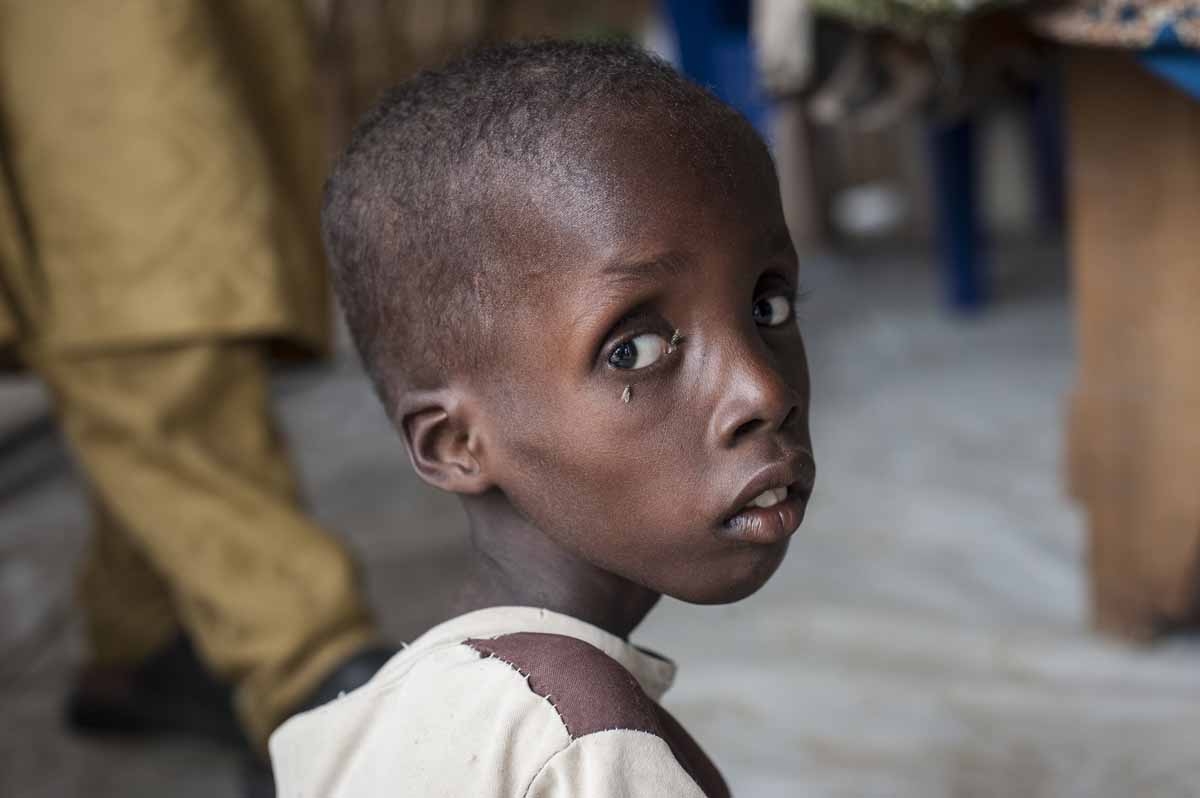
(AFP / Stefan Heunis)
Flies looking for moisture in the dry heat pester the eyes and mouths of women and children too weak to swat them away.
Women collect leaves from baobab trees in the surrounding areas to make soup while men collect braces and grass to build makeshift tents. Survival under these conditions is not easy.
We walk, weaving through the tents, following healthcare workers as they look for signs of malnutrition by measuring the diameter of the upper arms of young children. On the measuring tape there are demarcated sections of green, yellow and red. Green being acceptable, yellow moving into concern and red — 11.5 cm and below — indicating malnutrition.
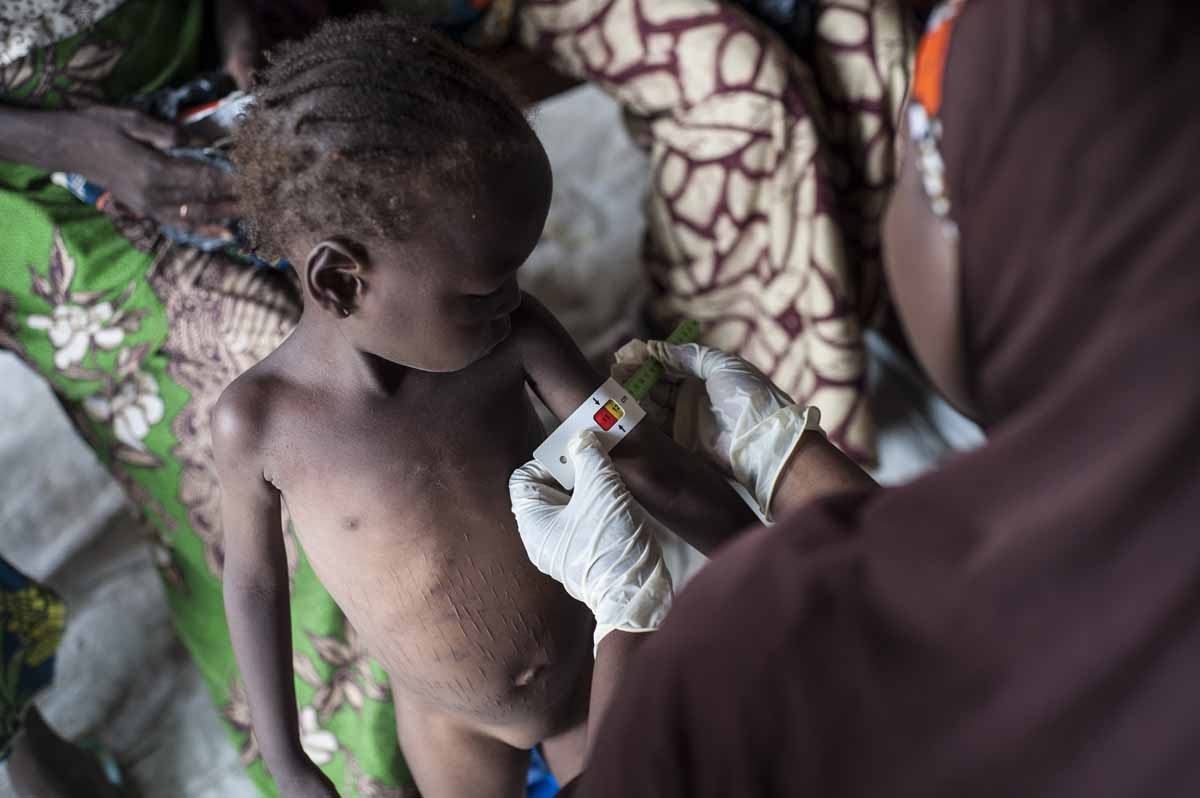
(AFP / Stefan Heunis)
Even the few head of cattle are in a bad way: they are basically dead, just skin and bone, with flies picking at the sores of their hides.
There are very few men. Women and children crowd around the only two waterholes with buckets and any available container to collect precious drinking water.
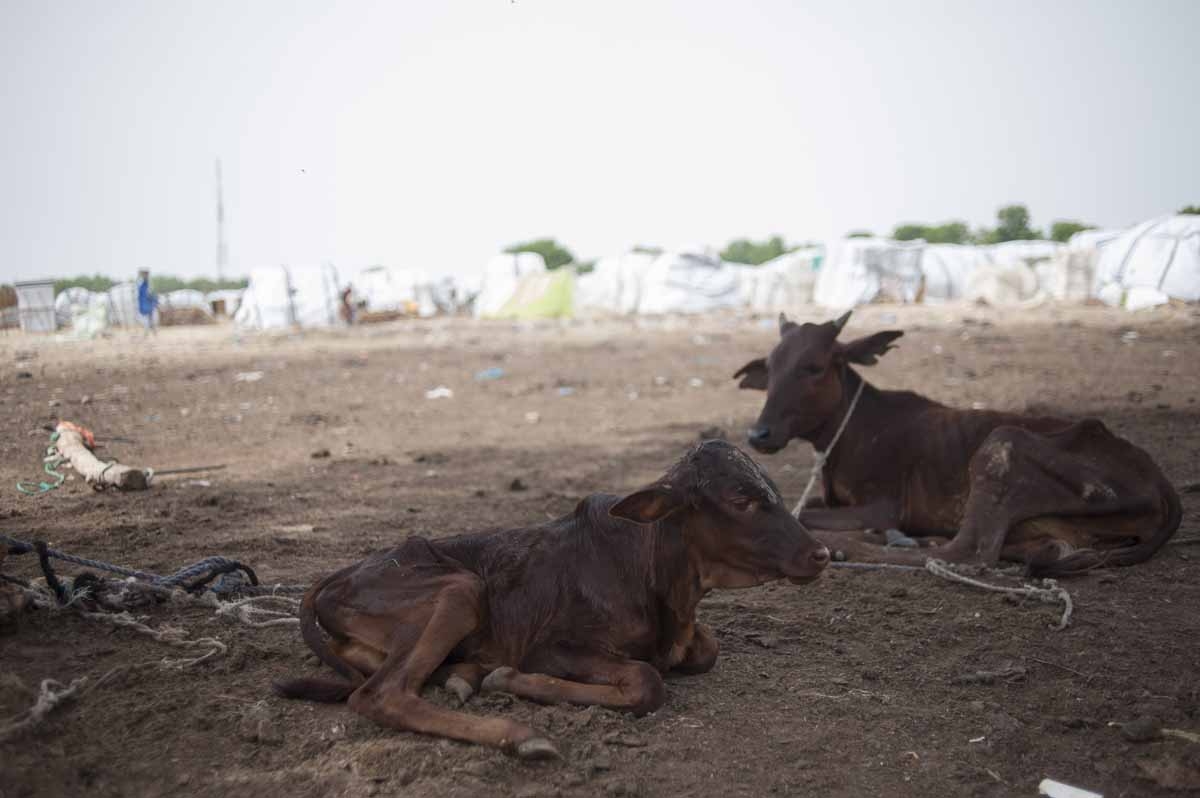
(AFP / Stefan Heunis)
The harsh light makes photography difficult. For most of the day, the sun shines from straight above, and by midday your brain is fried inside your head. The light is best described as ‘nuclear white light.’ The worst type for photos because the highlights tend to be too high, bleaching out parts of the photo.
Most of the mirages around me fled here because of the violence scarring this part of Nigeria.
Abandoning homes, subsistence farms, communities and all means of making a living, they arrived with nothing but the clothes on their backs.
Tree leaf soup is no substitute for regular meals of rice, chicken and vegetables, even with the high-energy nutrition packs handed out by the aid agencies for the most desperate.
Skin and bones
Conditions at the clinic are definitely not adequate. The structure itself is informal. Like the tents, it’s constructed out of branches and straw, no running water, just tables and benches, and a canvas covering the dirt floor.
Outside, there are lines of colourfully dressed women and children, from newborn babies to boys and girls up to the age of about seven or eight, all waiting to be assessed by patient medical staff to see if they qualify for some supplement nutrition packs.

(AFP / Stefan Heunis)
What strikes me most about severe acute malnutrition is the deformation it causes. The head becomes much bigger in proportion to the body, and the angular changes of the skeleton. Bones start protruding from under the skin, almost piercing it.
One six-month-old baby I photograph weighs only 3.2 kilograms -- that's less than many healthy newborns.
Another striking thing is the look in the eyes of children with severe malnutrition -- bright and curious mixed with anxious bewilderment.
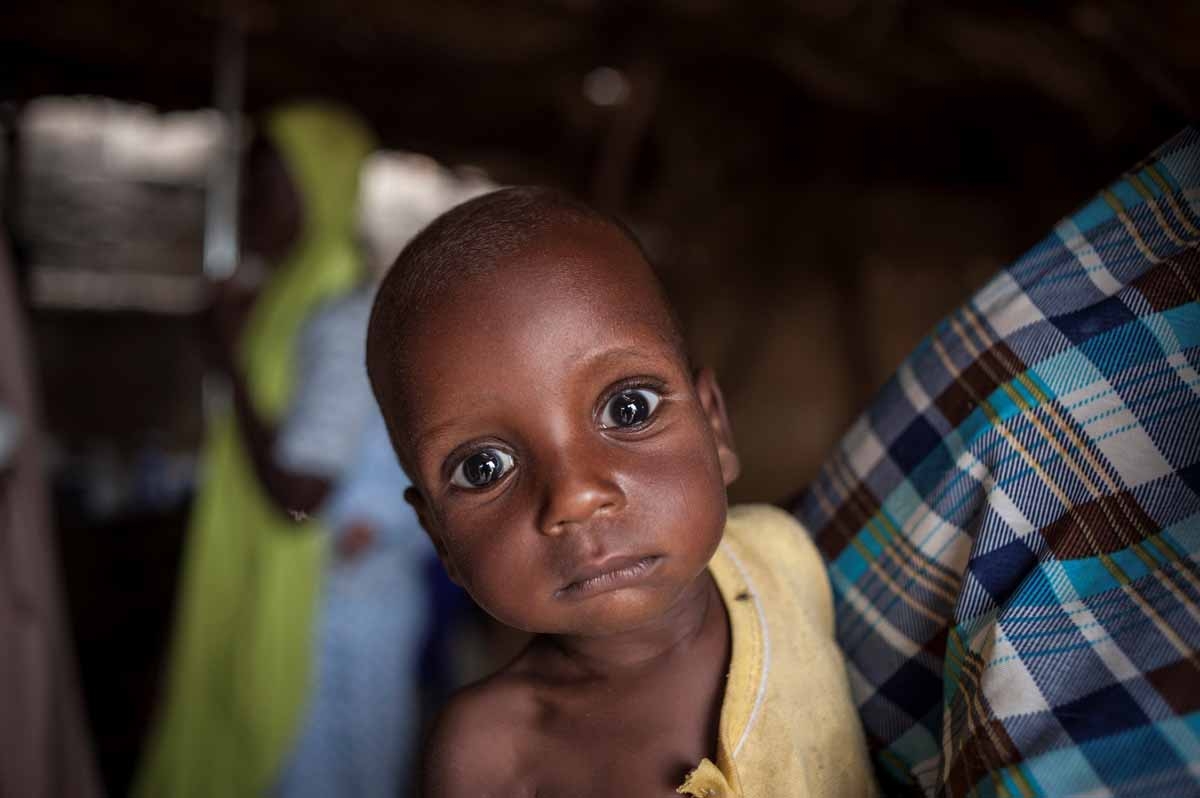
(AFP / Stefan Heunis)
Babies and toddlers frequently demand milk from their mothers. They willingly offer a breast, but nothing comes. The body has nothing left to give.
At first I get angry. How can the world allow this sort of thing to happen? These are children.
Then I feel like crying. But crying won’t help. Or change anything. The only thing I can do is to capture the situation as truthfully as possible.
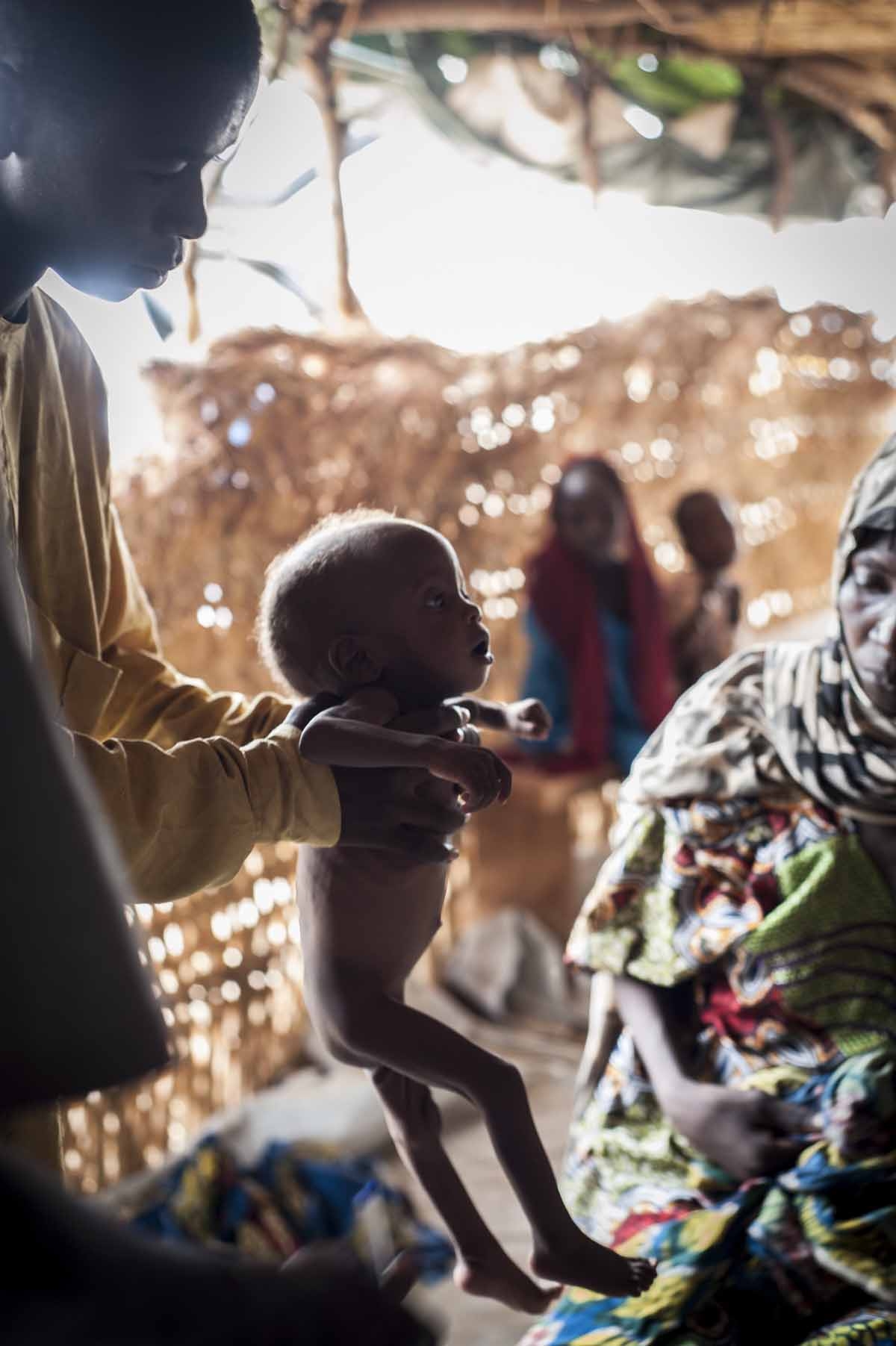 (AFP / Stefan Heunis)
(AFP / Stefan Heunis)
I find that the people I am photographing are generally accepting of us reporters under such extreme and artificial circumstances. If someone doesn’t want to be photographed, they indicate so by covering their face, or gesturing no with their hands. And then it’s not an issue.
Part of these people’s dignity was taken from them through loss and now hardship. People find pride in looking after themselves, even more so in a harsh and hostile environment. Before, they farmed their own land and fed their own children. Boko Haram stole that from them. They are now reliant on the goodwill of others.

(AFP / Stefan Heunis)
As I walk around, working, I feel a deep sadness. A sadness without a voice.
But despite this sadness, there are still small joys and genuine smiles to be found around this community, formed out of circumstance. Some of the boys have made toy cars from empty cans, wood, wire and clay and push them around in the dirty smiling and laughing.

(AFP / Stefan Heunis)
Once I filed the pictures and they were sent out to clients, they started being used as an illustration of a UN warning about the threat of malnutrition to the children of Borno.
The warning was stark: 250,000 children under the age of five risk suffering severe acute malnutrition in the state this year alone and 50,000 could die if nothing was done to to address the situation.
People who've viewed the photographs have had mixed reactions. Some say it is terribly sad; others asked why the Nigerian government doesn’t help; others made jokes; and some dismissed it as ‘poverty porn’.
There is a lot of clever sympathy and outrage to go around and probably not enough empathy. The stark reality remains: children are starving to death.

(AFP / Stefan Heunis)
One person dismissed the images as “voyeurism” and demanded why we didn’t help.
I don’t think any photographer in these situations get a kick out of starving children and displaced people. Voyeurism? ‘Poverty porn?’ Maybe, if you choose to see it as that.
But to me, it's also witnessing and communicating the reality on the ground. My images show life in the camps as accurately as possible, no better, no worse. You cannot take a picture of something that is not there.
Nigeria isn't just Lagos and Abuja, where flashy businessmen pop champagne and boast about the country being Africa's biggest economy.
Nigeria includes Maiduguri, war-torn and reeling after years of unrest.

(AFP / Stefan Heunis)
Boko Haram may be pushed out for now but the nasty consequences of the insurgency are only starting.
It is not a question of terrorists, territory or even religion, it's about human life.
Starving kids seem cliche, I get that. We've seen it all before in coverage from Africa. But they’re still starving. And they’re still children.
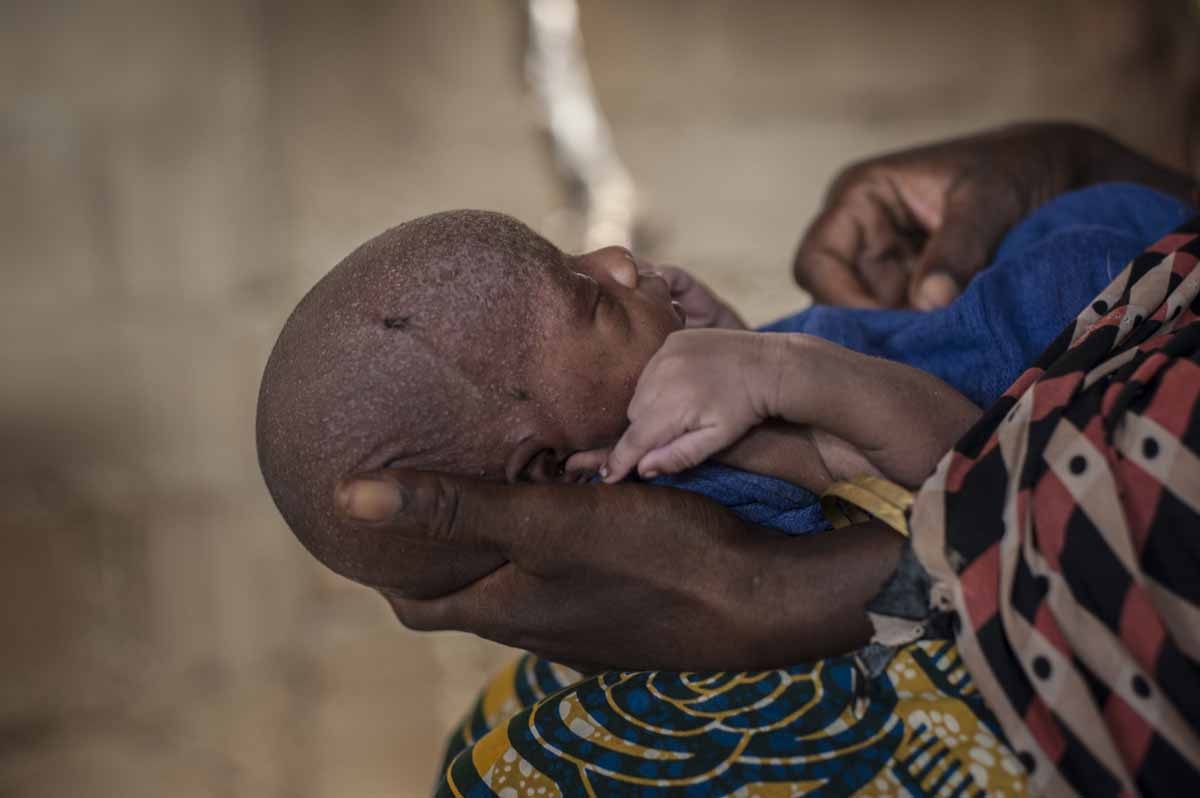
(AFP / Stefan Heunis)
The unprecedented kidnapping of more than 200 schoolgirls from the town of Chibok in 2014 drew global outrage, attention and condemnation.
But now 50,000 children (that’s capacity of a moderately-sized football stadium) face the possibility of starving to death, yet pretty much everyone is silent. Another humanitarian tragedy is unfolding before our eyes and the world is slow to react.
Where are the hashtags now?
This blog was written with Yana Dlugy in Paris.
Stefan Heunis
Maiduguri, Nigeria -- It may be the rainy season, but the savannah scrubland stretching out below me is dusty, dry and brown, linked by a spider’s web of dirt tracks and footpaths.
I’m in a plane descending toward the Maiduguri International Airport and squint to focus on the hamlets dotted across the landscape.
How do people survive in this harsh climate?
It’s my third visit here and once again I can’t see many natural water bodies, which gives me a familiar uncomfortable feeling. “How do people survive in this harsh climate?” I wonder. I remind myself to stay hydrated.
Touch down in Maiduguri and the light is blindingly bright. The air hits you in the face like a hairdryer on its hottest setting.
I’ve come here to report on the latest calamity to befall the capital of Borno state. Sitting on the north banks of the seasonal Ngadda river and historically a major commercial hub just south of the Sahara, it was fought over for centuries by traders, traditional and religious leaders, then about a century ago the colonialists.

(AFP / Stefan Heunis)
Over the past several years, it had become more notorious as the birthplace of Boko Haram, the Islamist group whose insurgency has devastated northeast Nigeria since 2009 and spilled across the border into Cameroon, Chad and Niger.
AFP has covered the insurgency since it began: the horrific and relentless attacks on mosques, churches, markets and bus stations, suicide bombings and raids on remote villages. In the last 18 months the Nigerian military, helped by its neighbors, has reclaimed territory from the insurgents, apparently weakening the radical group to the point of "technical" defeat.
But this doesn't mean the people living here are doing any better.
That's a fancy way of saying they're starving
Sometimes to death.
In recent weeks another shocking dimension of the conflict has emerged: severe food shortages have meant that hundreds of people -- in particular children -- are suffering from severe acute malnutrition.
That’s a fancy way of saying they’re starving. Sometimes to death.

(AFP / Stefan Heunis)
The camps for internally displaced people (IDPs) where the worst malnutrition cases have been reported are not accessible without military assistance, so we decide to drive to an informal settlement in Muna, a suburb on the outskirts of Maiduguri where the UN children’s agency UNICEF runs a nutritional clinic.
Maintaining dignity
Before going to a place like Muna, I always try to figure out the best way to portray the situation in the most honest way I can, while still maintaining the humanity in the subjects.
It is never easy to witness suffering and be practically powerless to affect change, to do anything about the people’s immediate circumstances.

(AFP / Stefan Heunis)
It’s challenging because you need to retain respect for your subjects, which in this case entails focusing a lens on them and capturing that moment in time. I believe part of that respect comes with sensitivity towards the different realities that you are presented with.

(AFP / Stefan Heunis)
My first impression of the Muna settlement is of a dry dust bowl, a barren patch of land devoid of grass and vegetation. The tents are scattered in clusters over the naked earth and the sun beats down on the ground.
You can practically taste the despair
It’s so hot that at first you don’t even notice the people. Everywhere you look are mirages from the heat and the people are blurred into the background and surroundings.
The camp is now home to nearly 16,000 people and is growing by the day. You can practically taste the despair -- there is no food, few opportunities and no shade.

(AFP / Stefan Heunis)
Flies looking for moisture in the dry heat pester the eyes and mouths of women and children too weak to swat them away.
Women collect leaves from baobab trees in the surrounding areas to make soup while men collect braces and grass to build makeshift tents. Survival under these conditions is not easy.
We walk, weaving through the tents, following healthcare workers as they look for signs of malnutrition by measuring the diameter of the upper arms of young children. On the measuring tape there are demarcated sections of green, yellow and red. Green being acceptable, yellow moving into concern and red — 11.5 cm and below — indicating malnutrition.

(AFP / Stefan Heunis)
Even the few head of cattle are in a bad way: they are basically dead, just skin and bone, with flies picking at the sores of their hides.
There are very few men. Women and children crowd around the only two waterholes with buckets and any available container to collect precious drinking water.

(AFP / Stefan Heunis)
The harsh light makes photography difficult. For most of the day, the sun shines from straight above, and by midday your brain is fried inside your head. The light is best described as ‘nuclear white light.’ The worst type for photos because the highlights tend to be too high, bleaching out parts of the photo.
Most of the mirages around me fled here because of the violence scarring this part of Nigeria.
Abandoning homes, subsistence farms, communities and all means of making a living, they arrived with nothing but the clothes on their backs.
Tree leaf soup is no substitute for regular meals of rice, chicken and vegetables, even with the high-energy nutrition packs handed out by the aid agencies for the most desperate.
Skin and bones
Conditions at the clinic are definitely not adequate. The structure itself is informal. Like the tents, it’s constructed out of branches and straw, no running water, just tables and benches, and a canvas covering the dirt floor.
Outside, there are lines of colourfully dressed women and children, from newborn babies to boys and girls up to the age of about seven or eight, all waiting to be assessed by patient medical staff to see if they qualify for some supplement nutrition packs.

(AFP / Stefan Heunis)
What strikes me most about severe acute malnutrition is the deformation it causes. The head becomes much bigger in proportion to the body, and the angular changes of the skeleton. Bones start protruding from under the skin, almost piercing it.
One six-month-old baby I photograph weighs only 3.2 kilograms -- that's less than many healthy newborns.
Another striking thing is the look in the eyes of children with severe malnutrition -- bright and curious mixed with anxious bewilderment.

(AFP / Stefan Heunis)
Babies and toddlers frequently demand milk from their mothers. They willingly offer a breast, but nothing comes. The body has nothing left to give.
At first I get angry. How can the world allow this sort of thing to happen? These are children.
Then I feel like crying. But crying won’t help. Or change anything. The only thing I can do is to capture the situation as truthfully as possible.

I find that the people I am photographing are generally accepting of us reporters under such extreme and artificial circumstances. If someone doesn’t want to be photographed, they indicate so by covering their face, or gesturing no with their hands. And then it’s not an issue.
Part of these people’s dignity was taken from them through loss and now hardship. People find pride in looking after themselves, even more so in a harsh and hostile environment. Before, they farmed their own land and fed their own children. Boko Haram stole that from them. They are now reliant on the goodwill of others.

(AFP / Stefan Heunis)
Sadness without a voice
As I walk around, working, I feel a deep sadness. A sadness without a voice.
But despite this sadness, there are still small joys and genuine smiles to be found around this community, formed out of circumstance. Some of the boys have made toy cars from empty cans, wood, wire and clay and push them around in the dirty smiling and laughing.

(AFP / Stefan Heunis)
Once I filed the pictures and they were sent out to clients, they started being used as an illustration of a UN warning about the threat of malnutrition to the children of Borno.
50,000 children could die
The warning was stark: 250,000 children under the age of five risk suffering severe acute malnutrition in the state this year alone and 50,000 could die if nothing was done to to address the situation.
People who've viewed the photographs have had mixed reactions. Some say it is terribly sad; others asked why the Nigerian government doesn’t help; others made jokes; and some dismissed it as ‘poverty porn’.
There is a lot of clever sympathy and outrage to go around and probably not enough empathy. The stark reality remains: children are starving to death.

(AFP / Stefan Heunis)
One person dismissed the images as “voyeurism” and demanded why we didn’t help.
I don’t think any photographer in these situations get a kick out of starving children and displaced people. Voyeurism? ‘Poverty porn?’ Maybe, if you choose to see it as that.
But to me, it's also witnessing and communicating the reality on the ground. My images show life in the camps as accurately as possible, no better, no worse. You cannot take a picture of something that is not there.
It's about human life
Nigeria isn't just Lagos and Abuja, where flashy businessmen pop champagne and boast about the country being Africa's biggest economy.
Nigeria includes Maiduguri, war-torn and reeling after years of unrest.

(AFP / Stefan Heunis)
Boko Haram may be pushed out for now but the nasty consequences of the insurgency are only starting.
It is not a question of terrorists, territory or even religion, it's about human life.
Starving kids seem cliche, I get that. We've seen it all before in coverage from Africa. But they’re still starving. And they’re still children.

(AFP / Stefan Heunis)
The unprecedented kidnapping of more than 200 schoolgirls from the town of Chibok in 2014 drew global outrage, attention and condemnation.
But now 50,000 children (that’s capacity of a moderately-sized football stadium) face the possibility of starving to death, yet pretty much everyone is silent. Another humanitarian tragedy is unfolding before our eyes and the world is slow to react.
Where are the hashtags now?
This blog was written with Yana Dlugy in Paris.
No comments:
Post a Comment